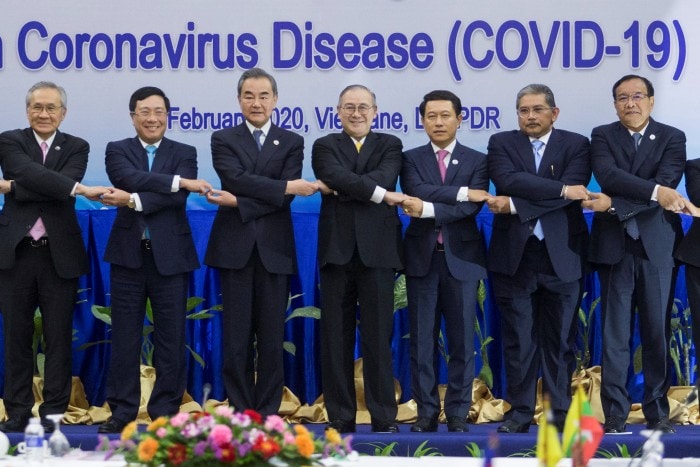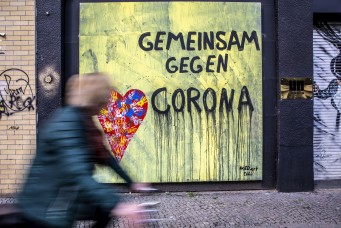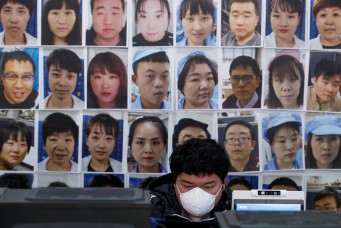Building a More Multilateral World Order
As COVID-19 amplifies isolationist trends in the West, Asian voices call for increased international cooperation.

Association of South East Asian Nations (ASEAN) foreign ministers pose during an emergency meeting with China’s Foreign Minister Wang Yi on the coronavirus outbreak in Vientiane, Laos February 20, 2020. Picture taken February 20, 2020. Phoonsab Thevongsa/Reuters.
In recent months, the COVID-19 pandemic has taken center stage in global affairs, sparking tensions and heated debates on the structure of the international order. The pandemic has bred skepticism towards existing mechanisms of international cooperation, such as the G7, G20, and the World Health Organization (WHO). While some view the crisis as an opportunity to reshape and strengthen existing institutions, others suspect that it will only deepen the wounds of an already fragile world order.
Asian countries, which account for 60 percent of the world population, are leading the call to bridge the divide. Some analysts predict that, in 2020, Asia’s GDP will overtake that of the rest of the world combined, giving the region greater clout. By 2030, the continent is expected to contribute some 60 percent of global growth. According to data from the World Bank, the world’s second, third, and seventh economies are Asian. No conversation can be had about the fate of the world order that does not include Asian voices.
“In this global debate, Asian perspectives are of the utmost importance,” said Ibrahim Awad, Program Director at the American University in Cairo (AUC)’s Center for Migration and Refugee Studies
In a webinar titled “Global (Dis)Order: Asian Perspectives,” held on June 3 and hosted by the AUC School of Global Affairs and Public Policy (GAPP), experts from China, Japan, Singapore and India gathered to discuss Asian responses to the COVID-19 crisis, ongoing tensions between China and the United States, and the future of the international order.
“China’s incredible response to the COVID-19 crisis has been described as unprecedented in history,” said George Yeo, Senior Adviser to Kuok Group and former Singapore Foreign Minister.
China’s Experience
In December 2019, the Chinese city of Wuhan became the first to record a cluster of cases of the novel coronavirus. As the outbreak spread across the country, the Chinese government responded with a bold set of lockdown measures, including strict restrictions on mobility and curfews in many cities. Within three months, the spread of the virus in the country had largely been contained, and by late March, the manufacturing sector recovered to nearly 80 percent of its capacity. While other sectors are still lagging behind, some experts retain hope for a V-shaped recovery, one where the drastic slowdown brought about by the pandemic will be followed by an equally rapid recovery.
Yeo, who shares the view that China’s economy is on the rise, went on to praise other Asian countries’ effective responses to the pandemic. “South Korea, Japan, Taiwan, and Singapore have all established a response to COVID-19 which is based on suppression,” he said. Yeo explained that while there is no telling when a vaccine will be made universally available, systematic contact tracing and quarantine measures have been relatively successful in containing the advance of the virus in these countries.
Wang Jisi, President of the Institute of International and Strategic Studies at Peking University, also praised China’s response to the pandemic, but expressed concern over the worsening state of US-China relations. “I think China’s performance in fighting the COVID-19 pandemic has been somewhat controversial,” he said, citing President Donald Trump’s claims that China could have stopped the pandemic before it spread to the rest of the world. Jisi noted that Trump initially praised Beijing’s handling of the outbreak, but as the virus spread among the American population, the US president’s stance changed drastically.
Indeed, in late March, a commercial aircraft delivered 80 tons of medical supplies from Shanghai to the U.S. By April, however, the remaining 22 flights scheduled to deliver additional equipment were slowed down by China’s newly implemented export restrictions. In the same month, White House trade adviser Peter Navarro accused the country of sending counterfeit testing kits to the US, and attempting to profit from the crisis. The Trump administration’s stance towards Beijing in matters regarding the pandemic has since been a highly contentious one.
Amidst present tensions, concerns have emerged over the future of the phase one trade deal that the two countries signed in January, which Trump has threatened to terminate over suspicions that China may not be willing to uphold its end of the agreement. Jisi went on to say that “the US has also recently threatened to crack down on Chinese companies,” referring to Trump’s announcement on May 30 that he has ordered an investigation into the “differing practices” of Chinese companies listed on American financial markets.
Jisi believes that the pandemic has only heightened existing tensions. “The pandemic began when the US had already decided to decouple with China in terms of trade, investment, and technological engagement” he noted, arguing that COVID-19 has simply accelerated American efforts towards this decoupling.
Yoriko Kawaguchi, Visiting Professor at Musashino University, Japan, is of the same opinion. “COVID-19 did not really start the tensions that we have now, but it did exacerbate pre-existing difficulties,” she said. Kawaguchi denounced what she rightfully described as a detrimental lack of international cooperation in the global response to the pandemic.
A Multilateral Solution?
Many countries have been slow to rally to the UN Secretary-General’s call for a global ceasefire, while the Security Council did not meet to discuss the COVID-19 pandemic until after the virus had already claimed over 40,000 lives across the world. As Shivshankar Menon, Visiting Professor at Ashoka University, India, further noted “the G20 response is very weak in comparison to what they did in April 2009, and the G7 has not even been able to come up with a statement”.
Indeed, while the G20 was the principal forum for coordinating the global response to the 2008 financial crisis, it has yet to set out a plan for recovery from the present recession. Moreover, the pandemic has given momentum to protectionist trends and calls for deglobalization, particularly in the Western world. The World Trade Organization predicts that global trade will fall by 13 to 32 percent in 2020. Leaders in the United States, France, Australia, and the European Union have made calls to work toward greater autonomy for their respective economies.
Yet, while calls to revisit globalization gain momentum in the Western world, panelists noted an increasing move toward regional cooperation in some parts of the Asian continent. “China is fully committed to the free trade agreement between China, Japan and Korea,” said Yeo. He further cited China’s renewed interest in the Trans-Pacific trade pact (TPP), an 11-nation trade agreement which was initiated by former President Barack Obama, and from which the Trump administration chose to withdraw in 2017. In South Asia, some regional cooperation has emerged from the crisis, though many like Menon would like to see that on a much bigger scale.
“In discussions about the world order, we have often tended to look Westward. However, I believe it is important to look globally, and I think there will be increasingly more common interests and engagement between West Asia – to which part of Egypt and the Arab world belongs – and the rest of Asia,” said Nabil Fahmy, former Foreign Minister of Egypt and founding Dean of the School of Global Affairs and Public Policy.
Fahmy went on to observe that while West Asia and Egypt’s extension into the Asian continent have often been the battleground of international conflicts, other Asian subregions have been better able to manage their differences, co-exist, and collaborate on many accounts. In paving the way forward, “I would encourage them to be the main proponents of a new multilateralism that includes us all,” he said.
During the Q&A portion of the event, Awad put forth the question of whether the world is moving toward a more isolationist, bipolar, or multilateral order. All panelists shared the view that the COVID-19 pandemic has triggered a rethinking of the global order, and agreed that such a restructuring should be achieved through international cooperation.
“Most people in China say the developing countries are a majority in the world, while the developed countries are few,” said Jinsi, before adding “I personally do not agree with this distinction. My academic view is that we should move forward as one world, not one divided between developed and developing countries.”
According to Yeo, any reshaping of the global order must do away with outdated notions of bipolar or unipolar power. In his view, the U.S. is fixated on the perceived threat of a growing Chinese economy. America’s leadership is operating on the basis that the rest of the world will choose sides, and each country will align itself with one of two superpowers. Such ideas, he asserted, are obsolete. “The old cathedral is collapsing, and the solution is not a new cathedral. The solution is more like a Middle-Eastern souk,” Yeo declared, making reference to what he hopes will be the end of a top-down model of international governance.
“I think the pandemic has really postponed the emergence of a new order,” said Menon. In his view, the world was already at the cusp of historical transformation when the outbreak began. The pandemic has only pushed this farther into the future. World leaders, he argued, are acting irrationally out of fear: it would be irrational for most countries to choose between one global power or the other, just as it is irrational for two highly interdependent economies like the U.S. and China to decouple. “To look to our leaders to reconstruct this world would not be very sensible. I think the way to rebuild this world is from the bottom-up,” he proposed.
Kawaguchi also stressed this point, noting that international cooperation is no longer restricted to intergovernmental agreements. “The good news is that international cooperation can now exist between businesses, between individuals, between academics, or between local governments. There are many different layers to it,” she explained.
Fahmy, for his part, argued that bipolar power structures have not existed for a very long time. In his view, such structures cannot exist in a world where states are no longer the sole actors of international change. Indeed, countries must now take a wealth of stakeholders into account: businesses, social networks, and many more.
“I have been trained to think of the world in terms of nation-states. My training is history. The system today has gone beyond my training,” concluded Fahmy.
Amina Abdel-Halim is associate editor at the Cairo Review of Global Affairs. Her work has appeared in Ahram Online, Al Ahram Weekly, the Cairo Review of Global Affairs, and the Cairo International Film Festival’s Daily Bulletin.
Read More



